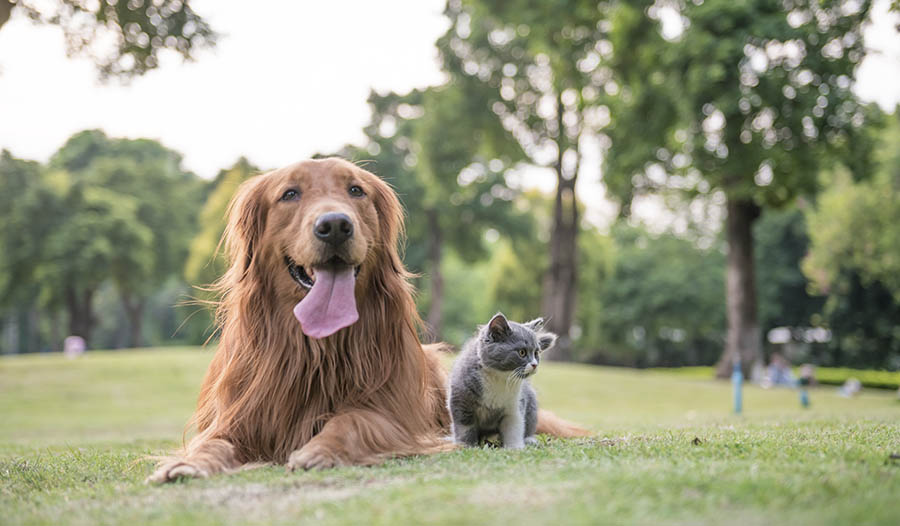The Best Supplements for Pets

Pets are family, too—which means we want the best products available for promoting their health and wellness! When it comes to health supplements, we often look for pet versions of the products we use and love for ourselves. But since pets are considered a specialty market, you may have a hard time finding products for them in your local store.
Although it may be tempting to use a product meant for people on your dog or cat, it’s best to choose products specifically designated for pets, as both the dosing and the ingredients themselves may differ between species. In addition, many supplements exist to address pet-specific problems. Here are four of my favorite pet supplements:
Supplements for Tear Stains
If you have a lightly coated, short-muzzled, or long-haired pet, you may be familiar with tear stains: dark reddish-brown streaks of color extending from the inner corners of the eyes. Dogs create excessive tears for a variety of reasons such as ingrown hairs irritating the eyes, shallow eye sockets, or anatomic defects in the tear ducts impeding normal draining of the tears. If your vet has ruled out a treatable condition, tear staining is usually managed as a long-term, chronic issue.
The reddish color of the stains is due to porphyrins, a naturally occurring molecule in tears that turns red when exposed to sunlight. While unsightly, the red itself is not indicative of blood or infection! However, a wet face is prone to secondary yeast infections, so you should keep your pet’s face clean and dry. In addition to cleaning the face, a tear stain formula supplement may be helpful in reducing the amount of porphyrin in the tears. It won’t reduce the tearing itself, but it can make the staining less severe.
Supplements for Hairballs
If you’ve ever had a cat afflicted with hairballs, you know the horrific hacking noise they make right before spitting a slimy, hairy glob onto your carpet or shoe. Since cats swallow a small amount of fur each time they groom themselves, it’s not surprising that hair can accumulate in the stomach. While vomiting that is frequent or accompanied by changes in weight, appetite, or coat condition can indicate a medical problem, one or two hairballs a month in an otherwise healthy cat are not normally a cause for concern.
In addition to regular brushing to reduce the number of loose hairs ingested, a hairball control supplement can help move the fur along the GI tract by acting as a fiber supplement. The gastrointestinal tract is intended to be a one-way system! Fiber is one of the most gentle and effective ways to promote healthy GI motility.
Calming Aids for Pets
It’s hard being a pet sometimes! Between doorbells ringing, vacuums roaring around, and strangers in the house, life can get stressful. And that doesn’t even touch on the holiday season! Anxiety and stress raise cortisol levels in the blood and can manifest in a variety of behaviors such as hiding, increased aggression, inappropriate elimination or even destructive behaviors such as chewing and excessive barking.
For mild to moderate stress, you may want to try a calming formula. A specific ingredient, L-theanine, is an amino acid found in green tea and thought to reduce cortisol levels and anxiety. Although severe anxiety cases or specific phobia-inducing events such as hearing fireworks might require behavioral modification training and prescription medication, these milder supplements may be just what your pet needs for day-to-day stressors when you don’t want a sedated pet.
Supplement for Scooting
Few things are as awkward as sitting in your living room with friends and family while your itchy dog scoots his rear across the carpet right in front of the assembled crowd. It’s not their fault they’re itchy, but no one needs that image in their head before dinner!
While pets can have itchy behinds for reasons varying from parasites to allergies, one of the most common reasons for scooting is inflamed anal glands. These small, raisin-to-grape sized sacs sit just inside the rectum and produce an oily, pungent secretion whose scent you will recognize forever once you’ve experienced it. The glands empty into the rectum through small tubes, which can become inflamed and then itchy, hence the dragging rear. Many people find a psyllium-based product helpful in maintaining a healthy colon!
Keeping your pet healthy takes time and effort, but it’s well worth it for all the love we get in return. And with convenient online shopping options making the process easy and fast, that’s all the more time you have to enjoy your pet!
DISCLAIMER:This Wellness Hub does not intend to provide diagnosis...

















































































 Table of Contents
Table of Contents














